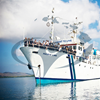KAR KAR ISLAND, Papua New Guinea — As dozens of mostly elderly people hugged the shoreline here this spring, they partially saw a welcomed sight: The m/v PACIFIC LINK, a YWAM Ships Kona medical aid vessel. The sight was partial because many of these islanders were beset by cataracts, a condition that causes clouded vision. The sight was welcomed because the ship was carrying a surgical team here to perform a procedure that was unprecedented in this isolated place — a technique that could restore vision.
The rural villagers waited on Wadau Bay beach as PACIFIC LINK crew deployed an inflatable raft and sailed ashore to begin shuttling each person onto the ship for surgeries. Some of the prospective patients were frail and used staffs to stay upright. They were accompanied by children or grandchildren who lifted them onto the ship. One of those needing help was 60-year-old Lamur Anish, who sought to regain use of his left eye.
"I can't look far through that eye; maybe it's a growth or something. I came here in hopes that I could get treatment," said Anish, who walked 30 minutes for his operation.
Once aboard, the islanders were greeted by YWAM volunteers who helped them register for eye operations and took their blood pressure. They also prayed with the patients — many of whom were extremely nervous about having a surgery that was unheard of for most Papua New Guineans.
As the patients anxiously awaited their chance to be operated on, they told their stories to volunteers. Most of them were older than 65. Many of them — like Anish — had not been able to see clearly out of at least one eye for a decade. Some have never been able to gaze upon their grandchildren. All of them have lost their independence and, for some, their livelihoods. The patients were all hopeful, but had no expectations regarding an outcome for the surgeries.
Each patient had about a 20-minute wait in the pre-operation room where they were dressed in medical gowns, caps and slippers. Then they were ready to see the Nepal-born Dr. Sunu Dulal, the only ophthalmologist in the history of Kar Kar Island to perform cataract surgeries.
Dr. Dulal and his team of eye-care specialists sought to make the patients — who entered the operating area two-by-two — feel at ease quickly. As the islanders stepped foot in the room, opticians said "Hello Papa," or "Good morning Mama," the way one respectfully addresses elders in the nation.
Nurses cleaned the patients eyes, then Dr. Dulal used a special tool to keep each patients' eye open to avoid inopportune blinking. Dr. Dulal then dropped anti-drying ointment into their eyes. Then he began to operate. After each surgery was complete and he removed the cataracts, he applied cream to each eye and covered them with a patch. The entire process would often end in 20 minutes or less from the time patients entered the room to the end of the surgery. Then they waited to be shuttled from the PACIFIC LINK back to land. Volunteers on board lifted the mood of the patients.
"They were excited because we were excited," said Evelina Ström, a 21-year-old Swedish volunteer. "They didn't know what to expect, but because of our reactions they began to have a sense of anticipation for the next day."
Patients returned to the ship less than 24 hours after being operated on. They had their patches removed and their eyes cleaned. Volunteers conducted eye-chart exams to gauge the success of the surgeries and test the progress of their recovery. They had the same test before the surgery as well. Eighty percent of the time, people who had the surgery had significantly better eyesight just 24 hours after the surgery. Many of the islanders exuded a sense of joy and disbelief. The patients lined up to take pictures with Dr. Dulal and express their gratitude to the entire team.
"I thank God that He has brought these people here to help us and I thank them for coming," Anish said.
The rural villagers waited on Wadau Bay beach as PACIFIC LINK crew deployed an inflatable raft and sailed ashore to begin shuttling each person onto the ship for surgeries. Some of the prospective patients were frail and used staffs to stay upright. They were accompanied by children or grandchildren who lifted them onto the ship. One of those needing help was 60-year-old Lamur Anish, who sought to regain use of his left eye.
"I can't look far through that eye; maybe it's a growth or something. I came here in hopes that I could get treatment," said Anish, who walked 30 minutes for his operation.
Once aboard, the islanders were greeted by YWAM volunteers who helped them register for eye operations and took their blood pressure. They also prayed with the patients — many of whom were extremely nervous about having a surgery that was unheard of for most Papua New Guineans.
As the patients anxiously awaited their chance to be operated on, they told their stories to volunteers. Most of them were older than 65. Many of them — like Anish — had not been able to see clearly out of at least one eye for a decade. Some have never been able to gaze upon their grandchildren. All of them have lost their independence and, for some, their livelihoods. The patients were all hopeful, but had no expectations regarding an outcome for the surgeries.
Each patient had about a 20-minute wait in the pre-operation room where they were dressed in medical gowns, caps and slippers. Then they were ready to see the Nepal-born Dr. Sunu Dulal, the only ophthalmologist in the history of Kar Kar Island to perform cataract surgeries.
Dr. Dulal and his team of eye-care specialists sought to make the patients — who entered the operating area two-by-two — feel at ease quickly. As the islanders stepped foot in the room, opticians said "Hello Papa," or "Good morning Mama," the way one respectfully addresses elders in the nation.
Nurses cleaned the patients eyes, then Dr. Dulal used a special tool to keep each patients' eye open to avoid inopportune blinking. Dr. Dulal then dropped anti-drying ointment into their eyes. Then he began to operate. After each surgery was complete and he removed the cataracts, he applied cream to each eye and covered them with a patch. The entire process would often end in 20 minutes or less from the time patients entered the room to the end of the surgery. Then they waited to be shuttled from the PACIFIC LINK back to land. Volunteers on board lifted the mood of the patients.
"They were excited because we were excited," said Evelina Ström, a 21-year-old Swedish volunteer. "They didn't know what to expect, but because of our reactions they began to have a sense of anticipation for the next day."
Patients returned to the ship less than 24 hours after being operated on. They had their patches removed and their eyes cleaned. Volunteers conducted eye-chart exams to gauge the success of the surgeries and test the progress of their recovery. They had the same test before the surgery as well. Eighty percent of the time, people who had the surgery had significantly better eyesight just 24 hours after the surgery. Many of the islanders exuded a sense of joy and disbelief. The patients lined up to take pictures with Dr. Dulal and express their gratitude to the entire team.
"I thank God that He has brought these people here to help us and I thank them for coming," Anish said.














